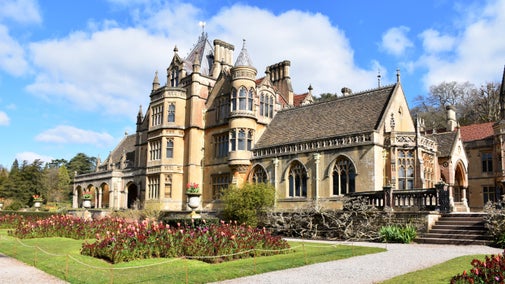
Discover more at Kingston Lacy
Find out when Kingston Lacy is open, how to get here, the things to see and do and more.

When Kingston Lacy was gifted to the National Trust in 1981, it was the largest ever bequest at the time. This ‘jewel box’ of a house, fashioned into a grand Italian palazzo in the 1830s, holds one of the UK’s finest private collections of paintings. Among other things to see are magnificent sculptures, bespoke furniture and Egyptian artefacts brought back by the intrepid traveller William John Bankes.
A sumptuous Victorian tea dress, part of Henrietta Bankes' wedding trousseau when she married Walter in 1897, will go on display from the end of March. The lace tea gown, decorated with rich purple velvet ribbons, was recently conserved to ensure it will be seen by future generations. Discover a pioneering female fashion designer, haute couture from the end of the 19th century and how Henrietta altered the gown after having children.
Interested in seeing behind the scenes at Kingston Lacy? The BBC's second series of Hidden Treasures of the National Trust features Kingston Lacy in episode one. You can watch the six-part series on BBC iPlayer.
The hall, with its creamy stone and classical columns, is grand but surprisingly low-key despite the ornate detailing. The drama begins when you turn the corner and see the sweeping marble staircase, with its trompe l’oeil effect ceiling, modelled on the staircase of the Palazzo Ruspoli in Rome.
Pause on the half-landing to admire three massive bronze figures – the work of sculptor Marochetti (better known for the Trafalgar Square lions) – that showcase the Bankes family heroes.
This intimate, book and picture-lined room has barely changed since the 18th century. The painting on the ceiling was created for a palace in Bologna more than 400 years ago but snapped up by William John Bankes in 1840.
The pink and gold colour scheme was the work of Henrietta Bankes (c.1871-1953), and is typical of the Edwardian look. It was here that she entertained royalty and reigned as a society hostess under the watchful gaze of her husband’s great-grandmother, Frances Woodley, painted by George Romney; and a unique collection of 50 enamel miniatures painted by Henry Bone (1755-1834).

Dominated by the magnificent but unfinished The Judgement of Solomon by Sebastiano del Piombo (1485-1547), the Dining Room is filled with intricate woodwork from the elaborate boxwood doors, carved in Venice, to the walnut shutters designed by William John Bankes himself.
This extravagant and glittering ‘Picture Room’ was William John’s proudest creation, the more remarkable for having been executed while he was in exile. He bought painted ceiling panels from Venetian palaces and lined the walls with finely tooled leather. He designed the 12 door panels himself, illustrating the months of the year, and gave detailed instructions for decorating the carved shutters. The walls are hung with pictures by Velazquez and Murillo.
Created from the original double-height hall, this neo-classical room was the scene of a ‘Grand Fete’ in 1791, when 140 guests danced from 9pm until 1am. It is now filled with some of Kingston Lacy’s finest masterpieces, including paintings by Titian, Rubens, Jan Brueghel the Younger and Sir Peter Lely.

The magnificent carved walnut and holly bed was once described as ‘a mistake in both design and taste’. It was commissioned by William John Bankes but not delivered until after his death (his brother tried to cancel the contract). The adjoining bathroom wasn’t plumbed in until the early 20th century.
Upstairs you'll find bedrooms both grand and not-so-grand. One favourite is the Tented Bedrooms: decorated to look like the inside of a striped campaign tent. These rooms would have been reserved for bachelor guests.
The White Bedroom was the private quarters of 26-year-old Henrietta Fraser when she married the 44-year-old sportsman Walter Bankes. It is a very feminine room, with French wallpaper and ornate white furniture.
Here you will find some of the ancient Egyptian artefacts William John acquired during his travels. These include papyrus drawings, scarabs and amulets.
There's so much for children to see, from a footstool shaped like a tortoise to a bed decorated with bats. The room guides have lots of stories to share, from Brave Dame Mary's spirited defence of Corfe Castle to Henrietta Bankes' parties for royalty. Ask in the entrance hall for a booklet that will help you spot some of the fascinating objects and stories in this family home.

Find out when Kingston Lacy is open, how to get here, the things to see and do and more.

A vision from Venice nestled in a pocket of Dorset. Read about Kingston Lacy’s most influential owner who made it the important place you see today.

Conservation work is a vital part of what the National Trust does at Kingston Lacy. Discover more about our latest initiatives.

Relax and wander the gardens to enjoy seasonal interest at any time of year, with plenty of space for children to run, skip and play, and spaces to stop along the way.

Historic buildings are a treasure trove of stories, art and collections. Learn more about their past and plan your next visit.

There's all sorts of houses and buildings to visit in Dorset, from an Italian-inspired mansion to a quiet writer's retreat. Discover new places to explore for a great day out.